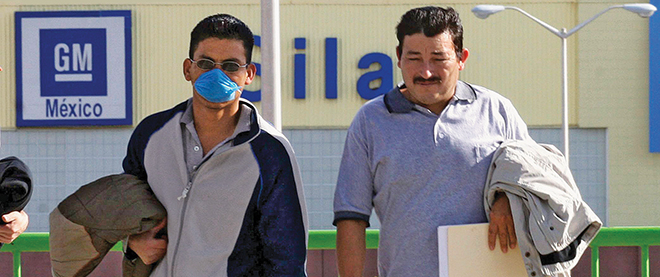Mexico’s economic moment
That boom coming from North America’s southernmost state isn’t just gunfire
Mario Armas/AP
Share

A new truck rolls off the assembly line every minute at the GM factory in the conservative Catholic heartland of Mexico’s Guanajuato state. The factory in Silao, set in the shadow of a giant Christ statue considered the geographic centre of the country, produces so many trucks that GM has expanded its workforce by more than 60 per cent since 2008 and has plans to hire even more. The nearby Volkswagen plant just opened a $550-million engine plant and Toyota has announced plans for a facility down the road.
Manufacturing activity is mushrooming across Mexico, mirroring an upswing in the overall economy. The country produced more than 2.8 million cars last year, while factories in border towns like Tijuana and Ciudad Juárez churn out everything from plastic toys to plasma TVs. Manufacturing is now moving back from China—almost as fast as it fled Mexico a dozen years ago—as Asian salaries and shipping costs continue to rise. “This has nothing to do with Mexico,” Ed Juline, head of Guadalajara-based Mexico Representation, a business consultancy, says of the trend. “It has everything to do with China.”
Ten years ago, wages in Mexico were six times higher than those paid in China, but the gap had narrowed to 40 per cent by 2011, according to an International Monetary Fund report. Geography also works in the country’s favour, as companies take advantage of its easy access to U.S. and Latin American markets, where economies are expanding, demanding Mexico’s autos, appliances and advanced electronics.
But manufacturing is just one part of the picture, as Mexico moves from mess to can’t-miss status, the hottest of the emerging markets. “This is Mexico’s moment,” said new President Enrique Peña Nieto, summing up the sentiment at his December inauguration. Indeed, the Mexican government is projecting growth of 3.5 per cent this year—better than Brazil, which investors are suddenly bearish on after a decade of adulation. In Brazil, a credit bubble appears set to burst and demand for its commodities is diminishing.
The scenario has created a collective giddiness among elites and investors unseen since the early 1990s, when Mexico prepared to enter NAFTA and appeared poised for First World status, only to suffer a calamitous peso crash. Last year, investors poured $80 billion into Mexican securities—five times more than went to Brazil, according to the Banco de México. But external factors also benefit Mexico, especially as the BRIC countries lose their lustre.“Brazil is a mess,” says Manuel Molano, adjunct-director of the Mexican Institute for Competitiveness, a Mexico City think tank, “China is decelerating, India’s growth has been stalled for three years, Russia is nothing special.”
Peña Nieto is pledging structural reforms to the energy, tax and social security systems—measures his party previously opposed. The reforms, he says, will generate six per cent economic growth, tripling the rate of the past dozen years. He’s formed a pact among the three main political parties to pursue his agenda and has already struck deals to overhaul labour laws and an education system that allowed teachers to sell their positions like personal property. “He’s a smart political negotiator,” says Molano. His administration is “resourceful in convincing people.”
The story doesn’t begin with Peña Nieto. For three decades, government policies have been geared to suppressing spending and controlling inflation that had climbed to triple digits. The central bank’s interest rate and inflation both now hover around four per cent, while central government debt is low, amounting to approximately 28 per cent of GDP. (It’s around 36 per cent in Canada.)
Remarkably, the raging drug war has done little to dampen enthusiasm for Mexico. “A pile of 49 headless human bodies on a roadside is apparently less scary than an interest rate cut,” says Ulysses de la Torre, a blogger who focuses on emerging markets.
How much the “boom” benefits average Mexicans remains to be seen. Almost half (46 per cent) say their economic condition actually deteriorated over the previous year, according to a recent poll, and many expect little improvement in the short term, says Federico Berrueto, director general of polling firm Gabinete de Comunicación Estratégica. Fully 59 per cent of Mexicans now work in the informal economy. “The average person sees unemployment, that ends don’t meet, that their salary is low,” says Berrueto. When compared to the perspective of international investors, “it’s two distinct worlds.”